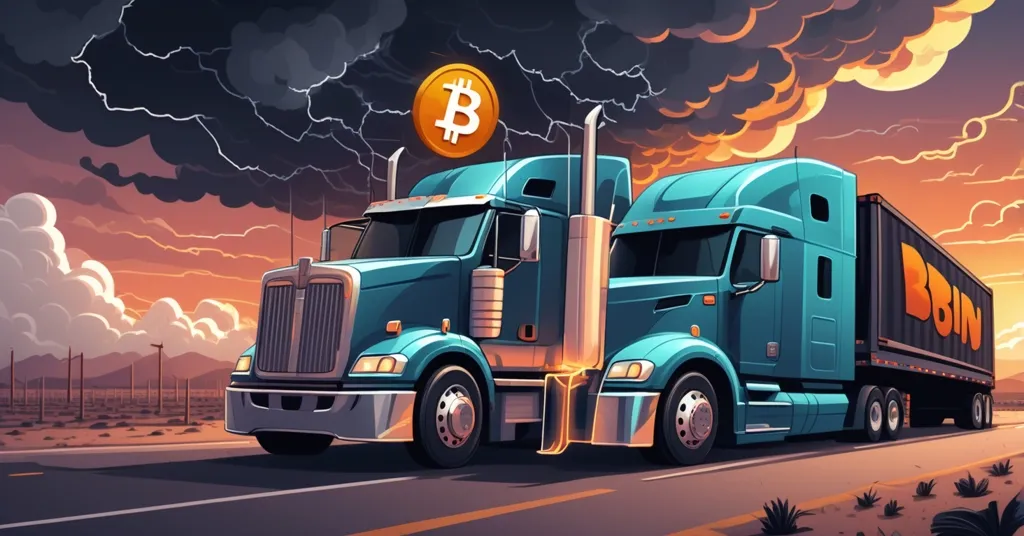US Truck Makers Flee to Mexico: Can Bitcoin and Blockchain Save the Industry?

US Truck Manufacturing Flees to Mexico: Can Bitcoin and Blockchain Offer a Fix?
Steep tariffs on raw materials are forcing US truck manufacturers to relocate operations to Mexico, exposing the flaws in protectionist trade policies. As production declines and costs spiral, could decentralized technologies like Bitcoin and blockchain provide a lifeline to an industry battered by bureaucratic missteps?
- Tariff Fallout: 50% tariffs on steel, aluminum, and copper derivatives push US manufacturers south of the border.
- USMCA Loophole: Duty-free trade rules under the US-Mexico-Canada Agreement favor Mexico-based assembly with lower costs.
- Crypto Potential: Bitcoin could hedge against economic chaos, while blockchain might untangle supply chain nightmares.
Tariff Trauma: Why US Plants Are Losing Ground
The US heavy-duty truck industry, currently worth a staggering $51.56 billion and projected to swell to $71.81 billion by 2030 according to Mordor Intelligence, is getting hammered by its own government’s policies. Under Section 232 of the Trade Expansion Act, tariffs as high as 50% on imported steel, aluminum, and copper derivatives are inflating costs for domestic manufacturers. On top of that, duties on components that don’t meet USMCA standards are piling on the pain. For those unfamiliar, Section 232 is a US policy often waved around as a national security measure to slap hefty fees on imports deemed vital—like steel for trucks or tanks. The idea? Protect American jobs. The reality? It’s pricing US plants out of the game, as highlighted in a recent analysis of US truck manufacturing moving offshore.
Under the USMCA trade agreement, which kicked NAFTA to the curb in 2020, goods can move duty-free between the US, Mexico, and Canada if at least 64% of a heavy truck’s value—rising to 70% by 2027—comes from North American parts, materials, or labor. Think of duty-free trade as shopping tax-free at an airport: meet the regional rules, skip the extra fees. But here’s the rub—building in Mexico, where labor is cheaper and compliance easier, shaves off a 3% cost premium per truck compared to US assembly, per Bernstein estimates. Take Daimler Truck’s Freightliner Cascadia, built south of the border for around $165,000, versus Paccar’s Kenworth T680, made in the US and priced at roughly $195,000. That $30,000 gap isn’t pocket change—it’s a market killer.
Mexico’s USMCA Advantage: Manufacturers Make the Move
The big players aren’t sitting idly by while costs bleed them dry. Paccar, based in Bellevue, Washington, and commanding a 30.4% US market share in the first half of 2025 with brands like Kenworth and Peterbilt, took a brutal $75 million hit from tariffs in Q3 alone. They’re now scrambling to source more USMCA-certified parts to stop the hemorrhaging. Daimler Truck and Traton, the Volkswagen-owned outfit running International Motors in North America, are doubling down on Mexico to exploit duty-free access to the US market. Volvo, with US plants in Virginia and Pennsylvania, isn’t immune either—they’ve pumped their Mexico investment to $1 billion as of April to offset domestic pressures, a trend driven by USMCA’s impact on production costs.
Traton laid out the cold, hard truth in a statement to Reuters:
This can offer a structural cost advantage versus U.S. production in cases where U.S. plants rely on imported steel, aluminum, or components subject to Section 232 or other additional tariffs.
Chad Dillard, Senior Analyst at Bernstein, didn’t hold back on the irony of this whole fiasco:
Companies with a higher manufacturing footprint in the U.S. than in Mexico are at a relative cost disadvantage and this is the complete antithesis of what the Trump administration wants.
Protectionism? More like a self-inflicted wound. Washington’s grand plan to save US jobs is shoving them out the door faster than a clearance sale. ACT Research predicts an 11% drop in US truck production by 2026, down to just 226,600 units, as tariffs collide with economic slowdowns. Meanwhile, the US Commerce Department’s Section 232 investigation is poking the bear further with a fresh inquiry into whether imported medium- and heavy-duty trucks and parts threaten national security. More tariffs? Stricter rules? The uncertainty is pure chaos fuel.
Bitcoin: A Financial Lifeboat for Economic Turbulence?
So, how does a digital currency fit into this industrial mess? Let’s zoom out. Tariffs jack up costs, spark inflation, and erode trust in fiat money—your dollar buys less as prices climb. Add potential trade wars, with retaliation from Mexico or even the EU as noted by Brookings, and you’ve got a recipe for economic instability. Enter Bitcoin, a decentralized store of value with a fixed supply of 21 million coins, untethered to any government’s whims. It’s like digital gold for times when centralized policies go haywire, and some see it as a potential hedge against trade tariffs and inflation. A trucking firm like Paccar, stung by currency exchange fees in cross-border USMCA trade, could settle invoices in Bitcoin and dodge a 5% banking cut. That’s real savings, not theoretical fluff.
But let’s not pretend it’s all sunshine and lambos. Bitcoin’s price can swing 20% in a week—hardly the stability a CEO craves for payroll. Plus, adoption is still niche; convincing suppliers to accept BTC is like teaching your grandpa to mine crypto—doable, but it’s a slog. And if the US starts sniffing around Bitcoin transactions as a tax evasion loophole for cross-border deals, expect audits or crackdowns to dampen the party. Still, in the spirit of effective accelerationism—pushing tech at warp speed to outrun broken systems—Bitcoin’s potential as a hedge against fiat failures can’t be ignored. Why wait for Washington to fix inflation when you can opt out?
Blockchain: Rewiring Supply Chains for Transparency
Now, let’s talk blockchain, the tech behind Bitcoin that could tackle the supply chain quagmire. USMCA compliance—proving 64% of a truck’s value is North American—is a paperwork nightmare ripe for fraud. Brookings points out cases of China routing goods through Mexico to dodge tariffs, muddying the waters. Imagine a blockchain ledger, a tamper-proof digital record, tracking every nut and bolt from factory to freight. A US inspector could instantly verify a part’s origin, slashing fraud and delays. Ethereum-based smart contracts could even automate it—release payment only when regional content hits the mark. Projects like IBM’s TradeLens already show what’s possible in logistics, and many are exploring how blockchain can improve supply chain transparency.
Yet, reality bites. Scaling blockchain across a fragmented industry means convincing every supplier to ditch paper for code—not a trivial ask. Transaction costs, or “gas fees,” on busy networks like Ethereum can sting, and slow processing times under heavy load could jam up real-time tracking. It’s a long-term play, not a quick fix. Still, when centralized trade systems breed inefficiency and distrust, decentralization offers a way to rebuild from the ground up. If we’re serious about disrupting the status quo, blockchain’s promise for supply chains, including specific solutions for USMCA compliance in manufacturing, is worth the grind.
Centralized Failure, Decentralized Future
Let’s not mince words: these tariffs are a textbook case of centralized policy backfiring spectacularly. They’re meant to shield US industry but instead fuel a mass stampede to cheaper pastures in Mexico. Behind the stats are real workers watching jobs slip south, while manufacturers grapple with a broken system. Bitcoin and blockchain aren’t just tech buzzwords here—they’re potential escape hatches. BTC could shield against the economic fallout of trade wars and inflation, while blockchain might restore trust in fractured supply chains. Sure, hurdles like volatility and scalability loom large, but effective accelerationism demands we push these tools now, not after the next policy blunder. The community discussions on tariff impacts reflect growing frustration with these policies.
As a Bitcoin maximalist at heart, I’ll say this: BTC remains the unshakeable king of value storage, a fortress against fiat’s flaws. But I’ll tip my hat to Ethereum’s programmable contracts as a secret weapon for supply chain woes—for now. Other industries, from automotive to electronics, face similar tariff squeezes, with companies like Paccar and Daimler feeling the burn from Section 232 tariffs on steel and aluminum, and are starting to test crypto solutions. This isn’t a niche trucking problem; it’s a systemic crack that decentralization can fill. The road for US manufacturing is riddled with potholes, but if we accelerate disruptive tech, we might just steer clear of the worst. Waiting on bureaucrats to solve this? That’s a fool’s bet.
Key Questions and Takeaways on Tariffs, Trucks, and Decentralized Tech
- Why are US truck manufacturers bolting to Mexico under USMCA rules?
Tariffs of 50% on raw materials like steel, plus penalties on non-USMCA parts, make US production a costly slog. Mexico offers duty-free access to the US market under the trade pact, saving companies like Daimler Truck up to $30,000 per vehicle with cheaper labor and compliance. - How do Section 232 tariffs ripple through the economy, and can Bitcoin help?
They drive up costs, fuel inflation, and risk trade retaliation from partners like Mexico, shaking faith in fiat stability. Bitcoin, with its borderless, government-free nature, offers a hedge for businesses and individuals against currency devaluation, though volatility remains a gamble. - Could blockchain solve supply chain fraud tied to USMCA compliance?
Absolutely, by logging every component’s origin on an immutable ledger, ensuring rules like the 64%-70% North American content threshold are met. It cuts fraud and paperwork, but scaling across suppliers and managing tech costs are stubborn roadblocks. - Are protectionist policies helping or gutting US manufacturing?
They’re gutting it. An 11% production drop by 2026 and shifts to Mexico prove tariffs are undermining their own goal. Centralized meddling is failing, pushing the case for decentralized alternatives. - Is decentralized tech a realistic answer to trade policy failures?
It’s promising—Bitcoin dodges fiat flaws, blockchain rebuilds trade trust—but without rapid adoption and regulatory clarity, it risks being sidelined as off-shoring worsens. We need to accelerate now to outpace the mess.



